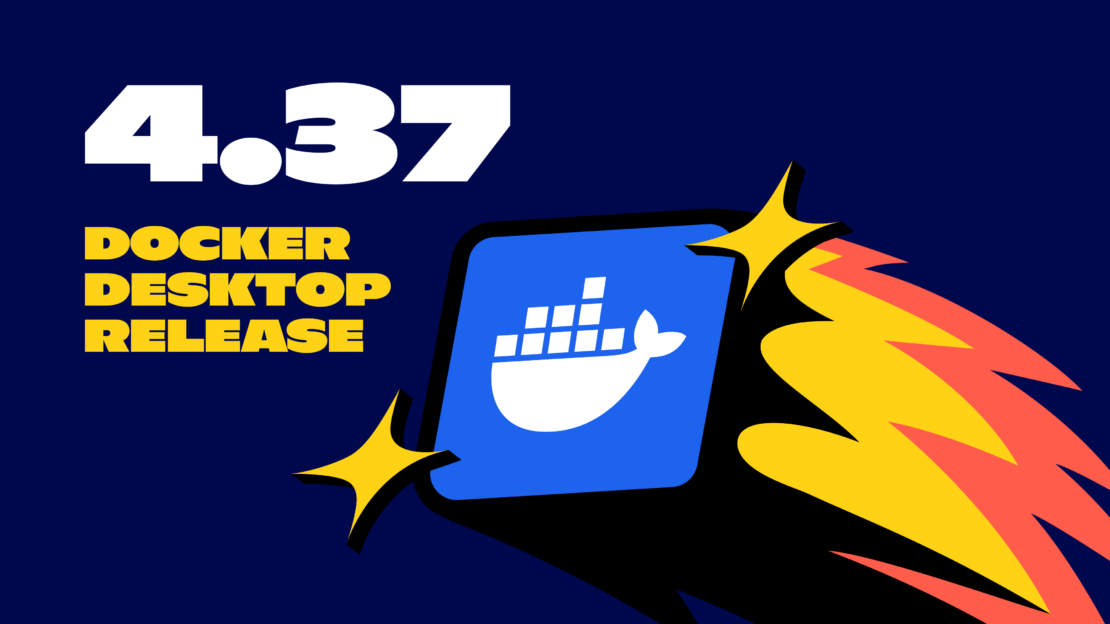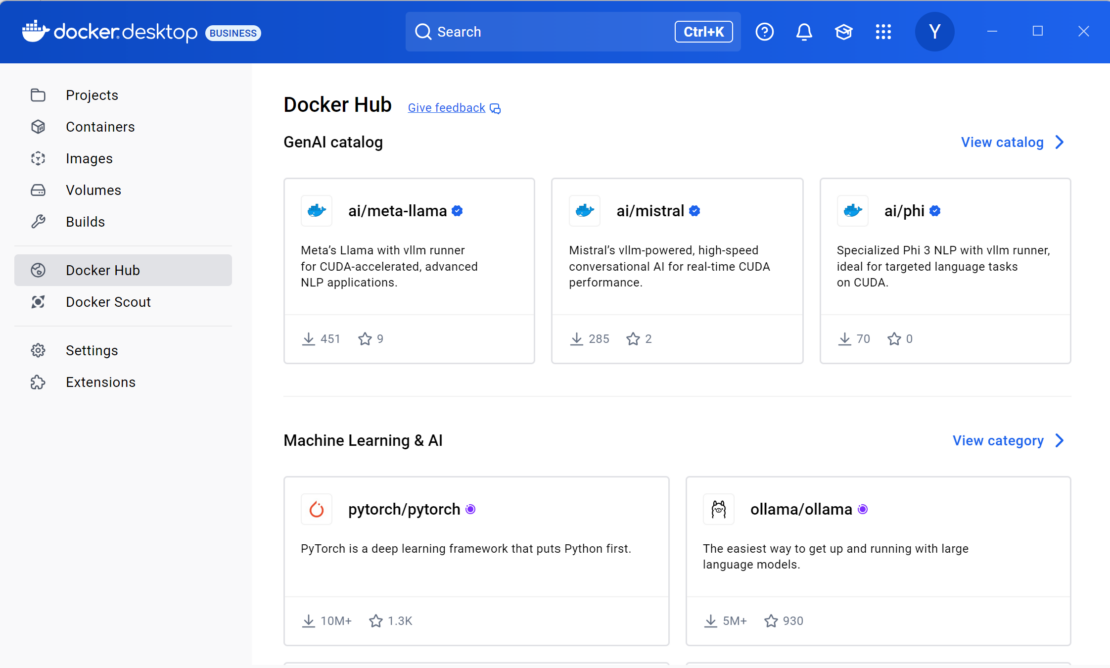Key features of the Docker Desktop 4.37 release include:
- Directly access the AI Catalog in Docker Hub through Docker Desktop
- Perform key operations, such as starting, stopping, and checking the status of Docker Desktop directly from the command line
- Component upgrades
- Bug fixes and stability improvements
The Docker Desktop 4.37 release brings incremental improvements that make developers’ lives easier by addressing common challenges in modern software development. With a focus on integrating AI resources and streamlining operational workflows, this update ensures developers can work faster, smarter, and more effectively.

Unlocking AI-driven development with Docker AI Catalog integration
AI/ML development is exploding, but many developers face hurdles accessing prebuilt AI models and tools. They often need to search across multiple platforms, wasting valuable time piecing together resources and overcoming compatibility issues. This fragmentation slows down innovation and makes it harder for teams to bring AI-driven features into their applications.
With Docker Desktop 4.37, the AI Catalog in Docker Hub is now accessible directly through Docker Desktop. This seamless integration enables developers to discover, pull, and integrate AI models into their workflows effortlessly. Whether you’re incorporating pretrained machine learning models or exploring generative AI tools, Docker Desktop ensures these resources are just a click away.

Key benefits:
- Streamlined discovery: You don’t need to leave your development environment to find AI tools. The AI Catalog is built into Docker Hub and can be immediately accessed from Docker Desktop.
- Faster prototyping: By eliminating friction in accessing AI resources, teams can focus on building and iterating faster.
- Enhanced compatibility: Docker’s containerized approach ensures AI models run consistently across environments, reducing setup headaches.
Whether you’re developing cutting-edge AI/ML applications or just beginning to experiment with AI tools, this integration empowers developers to innovate without distraction.
Command-line operations: Control Docker Desktop your way
For developers who automate workflows or work heavily in terminal environments, relying solely on graphical user interfaces (GUIs) can be limiting. Starting, stopping, or troubleshooting Docker Desktop often requires GUI navigation, which can disrupt automation pipelines and slow down power users.
Docker Desktop 4.37 introduces robust command-line capabilities for managing Docker Desktop itself. Developers can now perform essential tasks such as starting, stopping, restarting, and checking the status of Docker Desktop directly from the command line.
Key benefits:
- Improved automation: Script Docker Desktop operations into CI/CD workflows, eliminating manual intervention.
- Faster troubleshooting: Check the status and restart Docker Desktop without leaving the terminal, streamlining issue resolution.
- Developer flexibility: A smoother, distraction-free experience for developers who prefer terminal-based workflows.
This new feature bridges the gap between GUI and command-line preferences, allowing developers to tailor their workflows to their needs.
Upgraded components: Keeping developers ahead
Docker Desktop 4.37 includes significant upgrades to its underlying components, bringing enhanced performance, security, and feature sets such as GPU- accelerated workflows.
Here’s what’s new:
- Docker Buildx v0.19.2: Optimized multiplatform builds for faster, more efficient pipelines.
- Docker Compose v2.31.0: New Docker Compose enhancements make managing multi-container applications simpler and more powerful.
- Docker Engine v27.4.0: Ensures compatibility with the latest development tools and runtime improvements.
- Docker Scout CLI v1.15.1: Improved security scanning helps teams identify vulnerabilities earlier in the development cycle.
- NVIDIA Container Toolkit v1.17.2: Supports GPU-accelerated workflows, crucial for AI/ML workloads.
Bug fixes and stability improvements
At Docker, we aim to provide a stable and dependable development platform so developer teams can focus on creating, not troubleshooting. Docker Desktop 4.37 also addresses several key bugs and usability concerns:
- Default disk usage limit: New installations now default to a 1TB disk limit, offering additional flexibility for developers with large containerized applications.
- Loopback
AF_VSOCKconnections: Fixed to ensure container communication reliability. - CLI context reset fixes: Prevent unintended resets when restoring default settings.
- Dashboard synchronization: Ensures consistent behavior between the Docker Desktop Dashboard and the Docker daemon after engine restarts.
- Resource Saver mode stability: Resolves issues with mode reengagement, improving power efficiency for resource-conscious users.
Wrapping up
Docker Desktop 4.37 offers a step forward in enabling developers to innovate. With a focus on AI-driven development and automation-friendly operations, this release aligns with the evolving needs of modern software teams.
Learn more
- Authenticate and update to receive your subscription level’s newest Docker Desktop features.
- Subscribe to the Docker Navigator Newsletter.
- New to Docker? Create an account.
- Learn more about host networking support.









